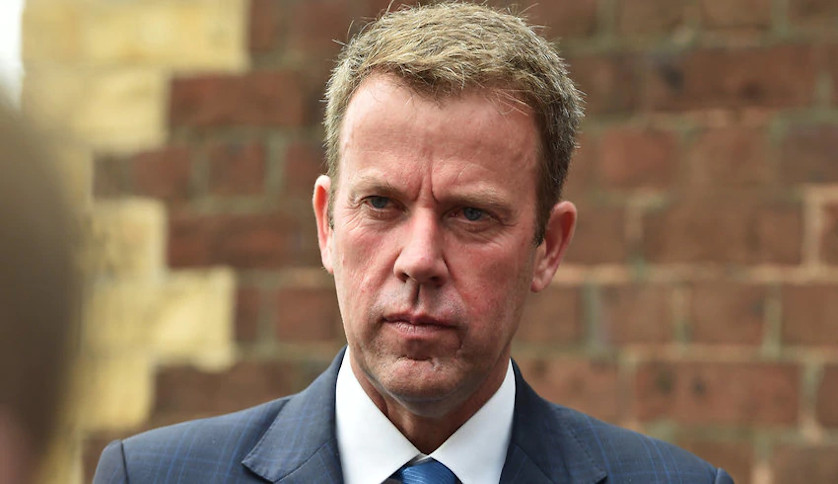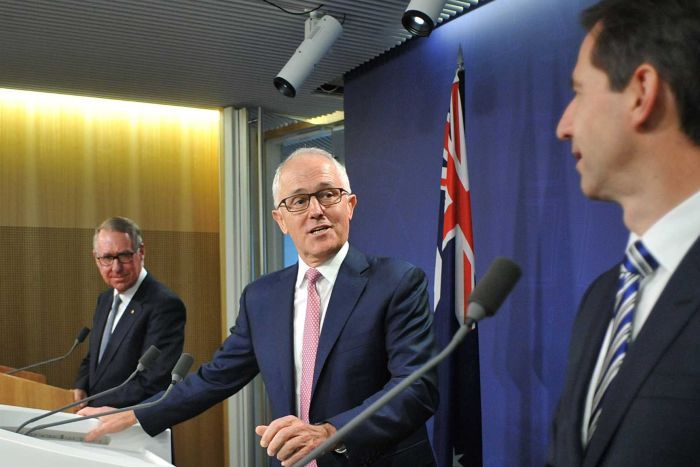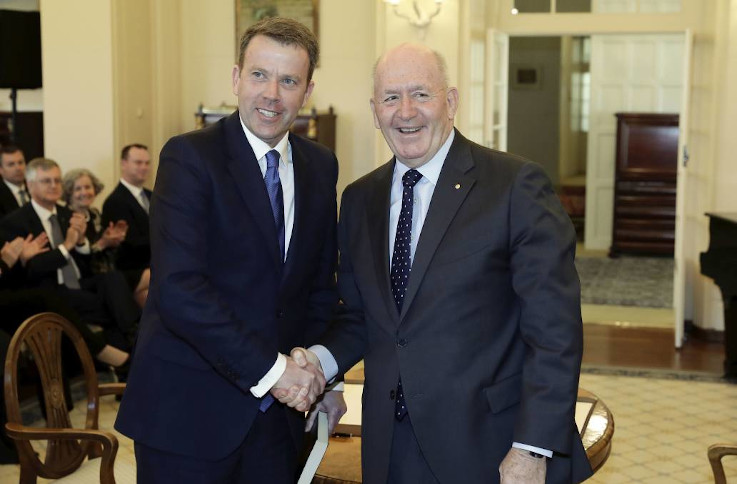The Morrison Cabinet: Is Dan Tehan good for education?
James Davis
Pictured: Scott Morrison’s new cabinet
The spotlight has been on the heavy hitters lately: Turnbull, Dutton and Morrison. However, the biggest question mark that any proponents of education ought to be concerned with is Dan Tehan, Simon Birmingham’s replacement as Minister for Education.
To understand the effect he could have on education, we’ll explore four things.
- His background
- Aspirations for education sector, if any
- Challenges previous government left behind
- Likelihood of being a boon for education
What’s Tehan’s background?
Dan Tehan grew up in rural Victoria surrounded by family in various political associations. His mother represented rural Victoria in its state parliament and his father was in the Victorian Farmers Federation, who his grandfather helped found. Ever since, his focus has lain on rural communities, working to bring about higher standards of telecommunication, less aggressive taxation on small businesses and pertinently, higher standards of teaching in these communities.
He worked in a variety of departments prior to his current appointment, including Senior Advisor to the Deputy Prime Minister and Chief of Staff to the Minister for Small Business and Tourism. His website acknowledges the importance of education and stipends for remote students, but all in all, his previous positions have not entailed educational reform, policy or input. This isn’t to say he isn’t capable; he certainly could be. There’s simply more to be understood before making the assessment.
What are his aspirations for education?

Pictured: Minister for Education Dan Tehan
According to his site, Tehan learned from his own experience that quality education in rural Australia is of great importance.
Granted, education’s of great importance everywhere in the world, but these communities find it challenging to provide. It has been the case for a long time that teachers simply gravitate to urban areas and cities in far higher numbers than rural communities. Of those present, they aren’t always of high calibre. For instance, an entire high school in rural NSW was caught teaching the wrong mathematics syllabus just last year for seven months. “This is not good enough,” said NSW Minister for Education Rob Stokes of the incident. “My heart goes out to those students and their parents; I am angry on their behalf.”
Regional Australia isn’t a perfectly competitive market. In 2011, it was found 66% of university graduates from rural backgrounds simply return or stay in their region of employment or further education. More importantly, they tend to have stronger ties to their communities, be it in the form of kinship with the land, familial obligations, socio-economic challenges or some combination of these. They don’t have the full platter of Australian universities to choose from. Only those close at hand.
Why does this matter? Well, their options are thereby limited. If there is only one school in your entire community, as was the case for the aforementioned high school, you aren’t choosing by what’s best. You’re choosing whatever’s closest. So then, what urgent incentive is there for these isolated institutions to improve? They effectively have monopolies on their respective regions.
It seems then that if Tehan decides to put his thoughts into action, helping provide quality education in rural communities is a worthy cause. If economic incentives in the form of fierce competition in the sector aren’t driving change (because they don’t exist), then perhaps government programs and regulation will. The Turnbull government just last year accepted all 11 of Flinders University Emeritus Professor John Halsey’s recommendations following his independent investigation into the matter, signalling positive change on the horizon. It’s not far-fetched to entertain the possibility that Tehan could work toward furthering this agenda despite any animosity that may exist between his government and its predecessor.
For now, there are more immediate challenges that require his attention.
What challenges have been left behind for him to face?

Pictured: Coalition announcing Gonski 2.0 in 2017
Even before being sworn in, Tehan has been pulled in multiple directions regarding the disproportionate amount of funding Catholic schools are getting. He’s already made urgent phone calls to stakeholders in the Catholic education sector to find a compromise.
This whole debacle is due to an education funding scheme in place with an equity component that we know today as Gonski 2.0, its predecessor being a Gillard government invention that was tabled in 2010. In the past, government education funding and substantial political pressure resulted in some Catholic schools that shall remain unnamed being substantially overfunded. The Gonski reform will resolve this in time, but not until 2024. Despite this, opposition leader Bill Shorten promised Archbishop Denis Hart earlier this year that Catholic schools “would be $250 million better off” should his party come to power, a sentiment the liberal party naturally slammed and others criticised as purchasing votes.
The Catholic church isn’t an easy institution to contend with; neither is the conflicted public. “It’s a tough thing because there’s a political dimension to it,” University of Western Australia Senior Lecturer Glenn Savage ruminated. “[Tehan] needs to try and keep certain groups happy. That’s the exact trap Julia Gillard fell into.”
To top it off, this particular wasp’s nest has already been kicked. His predecessor was the one instituting Gonski, after all. No matter how well-reasoned the argument for cutting back Catholic school funding might be, the fact is it’s happening. He’ll be under tremendous pressure to compromise, perhaps advancing the transition time or even reducing the severity of Gonski in order to enact the government’s will without impediment from the church.
This naturally leads to another question: are the Gonski reforms worth remaining uncompromising on? Where some commentators like Kevin Donnelly from The Australian describe Gonski as “flawed and inequitable,” leading to “exclusive and privileged independent schools” being “awash with funds,” others are convinced that sticking to previously laid plans is the best course of action.
Before understanding how and why deals should be struck regarding the protection and implementation of Gonski, Tehan first has to adequately answer the question of whether or not Gonski is worthy of the effort. Worse still, the terms of what constitutes an ‘adequate answer’ simply aren’t defined.
It’s a political seesaw like any other; taking from one party so as to give to another can incur the wrath of both. If he applies special considerations to Catholic schools as a result of political pressure, then other institutions will learn that political pressure is an effective means of securing additional funding. If he remains rigid and ignores the demands of the church, he’ll be accused of laying waste to the education system by opposition despite attempting the opposite.
How likely is it he’ll be good for education?

Pictured: Governor-General Peter Cosgrove congratulates Dan Tehan on his appointment
The plight of remote students and Catholic school funding are by no means the only issues faced by the new Coalition, but they are enormous. Simon Birmingham has left Dan Tehan with incredibly difficult and arduous challenges, which will undoubtedly require compromise and negotiations for months to come.
The public eye has had comparatively few opportunities to cast its gaze upon Tehan, but at this stage he’s in a rare place of innocence. Journalists grip their pens with white knuckles in anticipation. Labour party officials listen intently. Everyday people who may have animosity for Birmingham find themselves waiting to see if his successor is any different. Right now, all we have to go on is his immediate reaction to the problems he faces. What we’ve seen thus far is a man immediately getting on the phone and beginning negotiations, days before being sworn in. He’s served in a variety of departments to the best of his ability, from diplomacy to veterans affairs. If nothing else, this appears to be a man observant of the weight he’s been given, but this alone is fairly common. What makes Tehan different is he just might have the strength to carry it.